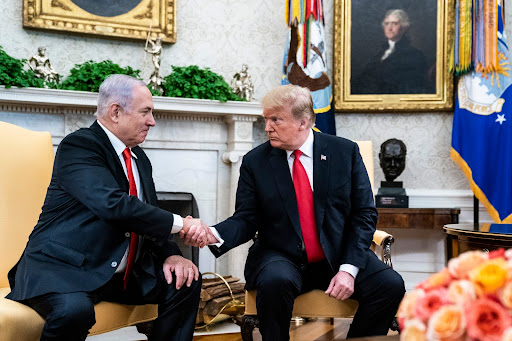
Jabin Botsford
WASHINGTON, DC - MARCH 25 : President Donald J. Trump greets Prime Minister of Israel Benjamin Netanyahu during a meeting in the Oval Office after signing a presidential proclamation on Golan Heights at the White House on Monday, March 25, 2019 in Washington, DC. (Photo by Jabin Botsford/The Washington Post)
Trump’s reelection does not only affect America; it will have resounding impacts worldwide. Trump has been a known supporter of Israel and Ukraine, meaning his reelection could change the course of the conflicts. One of the key factors of Trump’s first presidency was his pro-Israel policy. With the war between Israel and Hamas now continuing for over 14 months, Trump’s return to the White House may be especially significant for the Middle East.
Trump was proactive in his support of Israel throughout his first presidential term. He declared Jerusalem the capital of Israel in 2017, something that no US administration has done since the establishment of the state of Israel. This decision was met with global disapproval and demonstrations, especially from the Palestinians and other Arab citizens. Trump also shifted the U. S. Embassy from Tel Aviv to Jerusalem, which cemented his position and showed his strong commitment to Israel. In response to Trump’s reelection in November, Israeli Prime Minister Benjamin Netanyahu wrote, “Your return to the White House for a second time means a new start for America and a strong reaffirmation of the bond between Israel and the United States.” Netanyahu also offered his congratulations to Trump, calling his election performance “history’s greatest comeback!”
Under Trump, U.S. policy heavily favored Israel, with little tolerance for Hamas and other Palestinian factions. Trump’s administration classified Hamas as a terrorist organization and took a hardline approach toward those who supported it. The support of Israel’s military actions, including its blockade of Gaza and aggressive responses to Hamas attacks, has further strained the region with Palestinians feeling increasingly isolated and abandoned by the international community. Further worsening this tension, Trump withdrew aid to Palestinian refugees. The Brookings Institution stated that “Trump’s policies have deepened the chasm between Palestinians and Israelis, and shifted diplomatic momentum to further embolden the government of Israel.”
The reelection of Donald Trump will likely maintain U.S. support for Israel, which would have significant implications for the Israel-Hamas conflict and the broader Middle East. While Trump’s supporters argue that his approach strengthens Israel’s security, critics argue that his policies aggravate tensions and reduce the chances for lasting peace. As the conflict between Israel and Hamas continues, the global community will closely watch the trajectory of U.S. leadership and involvement.
In Eastern Europe, Ukraine’s President Volodymyr Zelenskyy congratulated Trump on what he called an “impressive election victory.” Zelenskyy stated, “I recall our great meeting with President Trump back in September when we discussed in detail the Ukraine-U.S. strategic partnership, the Victory Plan, and ways to put an end to Russian aggression against Ukraine.” Zelenskyy said in a social media post that Ukraine is “interested in developing mutually beneficial political and economic cooperation that will benefit both of our nations.” Zelenskyy’s comments and discussions with President Trump show potential for an alliance. However, the future of U.S. support for Ukraine would likely be influenced by Trump’s “America First” ideology. While Trump has expressed strong support for NATO, his policies often favored reducing U.S. involvement in overseas conflicts, preferring to encourage European nations to take on greater responsibility for their own defense. This could have significant implications for Ukraine, a country that has relied heavily on Western support to counter Russian aggression. The future of U.S. involvement in the conflicts in the Middle East and Eastern Europe will be dictated by Trump’s support of Ukraine and Israel.